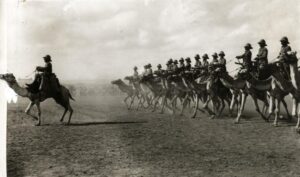Hargeisa (Hornpost) Professor Eid Ali Ahmed, a citizen of Somaliland living in Wales, described the great sadness and disappointment of how the legendary role played by thousands of Somaliland people in the Second World War has not yet been recognized fighting alongside the British forces to defeat the Nazi and Fascist allies of Italy.
Professor Eid Ali Ahmed said that it is a shame and a pity that the commemoration of the day of the victory of Europe in the Second World War (80th anniversary VE Day) did not mention the heroes and heroes of Somaliland who participated in the war with the British Empire, while countries another ally was mentioned.
Professor Eid Ali Ahmed who reported to the international media Nation.Cymru said “It is the day of VE (the 80th anniversary of Hitler and his alliance including Italy and Somalia defeated the UK and an alliance that includes Somaliland. Thousands of Somaliland people participated in the Second World War.
It is a shame and unfortunate that the people of Somaliland who participated in the 2nd World War should not be celebrated today for their sacrifice and bravery, in commemoration of the 80th anniversary of the VE today, while the others of the Alliance attended the event and parade.”
“The people of Somaliland who sacrificed their blood and lives for the freedom and peace of the world. It seems that their history has not yet been included in the general war memorial book. The efforts and sacrifices of the Somaliland army were not mentioned and were not fairly recognized, said Professor Eid.
Eid Ali Ahmed added that “Somaliland heroes participated bravely, honestly and selflessly in the first and second world wars to defend the British Empire, but unfortunately their stories are not given the recognition they deserve,” said Professor Eid told Nation.Cymru
He added “It is very unfortunate that the sacrifices and efforts made by the people of Somaliland during the Second World War were not mentioned in the VE Day ceremony, while other allied countries were honored at the ceremony.”
Professor Eid talked about the history of the Second World War and the role of the Somaliland heroes who participated in the war and said “In 1940, the Italian army attacked the British forces in the Somaliland Protectorate many, which led to the withdrawal of British troops from Somaliland to Aden in August of the same year.
The Italian army had a military strength of 91,000 soldiers, while the British forces in Somaliland were much smaller. When the British left, Italy and the Somali forces under Italy took over the livestock of the local people.
After six months, the British troops returned to Somaliland and with the help of Somaliland troops defeated the Italian and Somali forces.”
Professor Eid said that no matter how much the people of Somaliland fought with loyalty, they did not receive the same official recognition or reward as the soldiers who fought for France and even Italy itself.
Somaliland Cavalry
Professor Eid Ali Ahmed noted that in 2002, the British Queen Elizabeth II unveiled a monument in London commemorating the Somaliland Cavalry (Somaliland Camel Corps). Also, the cemeteries in the city of Hargeisa mention the names of the soldiers who died in the first and second world wars.
Eid Ali Ahmed called on every citizen of Somaliland to remember the sacrifices made by their fathers and grandfathers and said “Every citizen of Somaliland should remember the sacrifices made by their fathers and grandfathers. Somaliland’s forces were at war with German and Italian forces during the First World War, especially the Tanganyika, and the Second World War, which they participated in in places such as Somaliland itself and Burma. Also, in 1982, when they were sailors (seafarers), they played a role in the Falklands War.”
The British forces fighting in Burma were led by Captain Richard Darlington of the King’s African Rifles. When he met the courage and good behavior of Somaliland people in Burma, he decided to settle in Somaliland after the war, changing his skills and joining education.
Awards (OBE & MBE)
Darlington spent most of his working life in Somaliland. He became the first principal of Amoud High School, and then he was transferred to Sheikh Secondary School, known as “Eton in Somaliland.” He received the MBE award in 1956 and the OBE in 1962. He became widely loved, and people nicknamed him Gacmadhere, which shows a person with a long hand (supporting people).
Darlington left Somaliland in 1971, two years after the overthrow of Siad Barre, and died in Wales in April 2007. His family and some of his former students, led by Professor Eid , founded a charity called the Darlington Gacmadhere Foundation, which gave poor students in Somaliland the opportunity to study in the country’s universities.
Eid Ali Ahmed shared the events of this article with the media; he was one of the students taught by Darlington.
Source: Nation.Cymru
Hornpost staff Reporter

